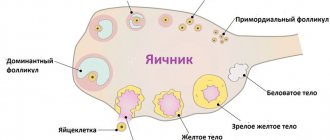Hi all! I am 12 weeks pregnant, tomorrow I am admitted to the day hospital due to the threat of miscarriage. I was prescribed Magne B6 2 tablets 3 times a day and Utrozhestan 200 mg 1 time a day, but they said that they would also give me Duphaston. Tell me, who has encountered such an appointment? Some strange purpose of both Utrozhestan and Duphaston at the same time Read more →
Before I had time to rejoice at my pregnancy, which was confirmed not only by a home test, but also by a blood test for hCG (human chorionic gonadotropin), I soon discovered brown discharge on my panty liner, albeit a little, albeit barely noticeable, but it was still there ! I immediately rushed to work (I worked at a medical center) and there I eagerly awaited the arrival of one of our gynecologists. The doctor, a woman I respect very much, listened to me and questioned me, pointed to the couch, offering to do an ultrasound. Let me make a reservation right away that... Read more →
Well, the 20th week has begun. Almost half of the pregnancy is over. Well, it’s time to write in my diary about what happened during this time. Pregnancy fell out of the blue, although my boyfriend and I worked for this result for almost a year. Situation. Continue reading →
Dmitry Lubnin compiled 30 signs that you should doubt the actions of the gynecologist and get another consultation. 1. You are offered treatment for HPV (human papillomavirus) 2. You are tested for infections, noting more than 5 points in a smear and 4 points in a blood test 3. They indicate to you the presence of condylomas on the genitals, which need to be removed, and you didn’t notice them yourself, or they are very small and don’t bother you in any way. 4. Treatment of any infection or inflammation. Continue reading →
Girls, good afternoon. From the very beginning I was going crazy with pain in the lower back, the doctor said that it was because of UPD. And for several days now a nagging pain in the lower abdomen has been added. It's like your period is about to start. Sometimes there is pain in the cervical area. I already have 6 miscarriages after my second birth, but usually it looked like this: I wake up in the morning, everything is covered in blood, I get out of bed and everything pours out like a bucket. We didn't even have time to do anything. I take: magnesium B6, duphaston, utrozhestan (yes, at the same time! No, not. Read more →
10 signs that you are WANTED! 1. When you go to the pharmacy, the pharmacist, without asking questions, gives you folic acid, sage, boron uterus, red brush, vitamin E, utrogestan or duphaston, ovulation tests, pregnancy tests with different sensitivity, etc. 2. Your husband knows yours perfectly cycle and on the days of expected ovulation comes home with a police squad. 3. Your husband is ready to run for office, at least as a deputy, just to gain immunity. 4. When your husband pronounces the word “spermogram,” he immediately takes it. 5. Read more →
My third Miracle was as expected as my body behaved unpredictably this time (compared to the two previous B). When you are waiting for your Dite and your expectation does not keep itself waiting, this is Happiness, and when a train with lucky tickets passes by you for more than one month. and then you are in it - this is HAPPINESS, but first things first (Very long, anyone who wants to drink a cup of coffee is welcome). I've been closely on the website of the BB "Conception" since January 2013. I found out day after day. Continue reading →
Dmitry Lubnin compiled 30 signs that you should doubt the actions of the gynecologist and get another consultation. 1. You are offered treatment for HPV (human papillomavirus) 2. You are tested for infections, noting more than 5 points in a smear and 4 points in a blood test 3. They indicate to you the presence of condylomas on the genitals, which need to be removed, and you didn’t notice them yourself, or they are very small and don’t bother you in any way. 4. Treatment of any infection or inflammation. Continue reading →
Hi all! For girls, this is the situation: the first pregnancy was in December 2012, the second birth was in October 2014, it turned out that she became pregnant in December 2014. It didn’t work out for a long time, I calculated charts, I ran around for ultrasounds. There were two surgeries, the first in November 2011, a follicular cyst of the left ovary burst, was prescribed for about three months, there was no way to plan it, I cried every time I drank these for approx. I stopped drinking ok in January, months came, I went for an ultrasound at 7 dc and there was a cyst 8 cm. Urgent ok, others, again at 6. Read more →
Pre-conception stage
Not all women, especially those over 30, find it easy to get pregnant.
Often it is necessary to carry out special preparations for conception. In any case, all women need to go through all stages of preconception preparation before pregnancy in order to increase the chances of a favorable conception, calm gestation and the birth of a healthy child.
If, during the examination, the doctor discovered changes and disturbances in the reproductive system that may interfere with pregnancy, then treatment will be required. Indications for the use of Progesterone drugs will be the following conditions:
- corpus luteum deficiency;
- low levels of Progesterone in the blood;
- scanty or irregular menstruation;
- a thin inner layer in the uterus, revealed by ultrasound;
- presence of gynecological pathology (fibroids, endometriosis);
- chronic inflammation in the uterine cavity;
- endocrine diseases:
- secondary or temporary hyperprolactinemia;
- vascular disorders in the pelvic area;
- changes in the blood coagulation system with a risk of thrombosis.
In each specific case, the doctor will make a decision individually, but in most situations at this stage it is better to take Duphaston tablets according to the regimen proposed by the doctor. The drug is taken orally and acts on the entire body, having a maximum positive effect on all organs and systems involved in preparing for conception. Utrozhestan capsules work great at this stage, but this drug is most effective when applied topically when pregnancy has already occurred.
The first weeks after conception
A happy event happened: the strip test showed 2 stripes. The time of joy should not be overshadowed by unpleasant symptoms of a threatening condition.
To prevent even minimal risk to the embryo at the implantation stage, it is necessary to create maximum conditions in the uterus.
This is exactly what Duphaston can provide, which must be taken in the dose prescribed by the doctor. Sometimes minimal amounts of the drug are enough, but if the need arises, the doctor will prescribe maximum dosages.
If conception occurred unnaturally (IVF), then to preserve the embryo you can take Utrozhestan in the form of vaginal capsules. In this case, a much better effect will be from the local effect of Progesterone preparations on the organs of the reproductive system and the rapidly growing embryo.
Duphaston and Utrozhestan. What is the difference?
Description of the drug Duphaston
The main constituent substance in the drug Duphaston is dydrogesterone
, which in its qualitative composition and structure is very similar to progesterone. It has been proven that this compound does not have pronounced androgenic activity, and therefore does not cause adverse reactions that are typical for groups of substances with such properties.
This substance is the main progestogen element in HRT
. In addition, it helps preserve the lipid composition of blood plasma, but does not disrupt the level of blood clotting indicators, in particular coagulation.
An important role is played by the course of taking the drug. As soon as the required concentration is created in the human body, the drug creates ideal conditions for conception and preservation of the fetus during the threat of miscarriage
.
Main indications
Prescribed for deficiency of natural hormones
in organism. So conditions that are characterized by a lack of progesterone include:
- infertility of various origins, including due to the lack of the hormone lutein;
- irregular menstrual cycle;
- risk of miscarriage;
In addition, it is considered a major component of hormone replacement therapy.
Contraindications for use
The main limitation for use is specific intolerance to the main component of the drug. It is possible to take the drug during pregnancy
, however, during breastfeeding it should be abandoned, since
dydrogesterone is excreted along with breast milk
.
How to use Duphaston
Due to the fact that it is used for the most common gynecological diseases, its dosage regimens are very different. As mentioned earlier, it is used in the treatment of endometriosis, the treatment of premenstrual syndrome, infertility and many other diseases. As a rule, when taking the drug, the cyclic activity of eggs in the female body is strictly controlled. The most common treatment regimens are to take the drug in 10-day courses from the 5th to the 25th day of the cycle in the treatment of endometriosis, and from the 11th or 14th to the 25th day of the cycle
, in the treatment of infertility and premenstrual syndrome.
When treating infertility, this pattern is maintained for the next 6 or more cycles
. As for the constant oral administration of hormonal contraceptives, the combination of taking Duphaston and these medications is quite possible.
Side effects of Duphaston
The primary, or frequently occurring, side effects of the drug are migraine, tenderness and engorgement of the mammary glands.
. Peripheral edema and pain in the lower abdomen occur extremely rarely. In exceptional cases, bleeding and hemolytic anemia are possible.
Description of the drug Utrozhestan
What does it represent? Unlike its synthetic analogue, it is natural and contains natural progesterone.
. This substance is not only a gestagen that produces the corpus luteum, but also interacts with the cells of the nerve endings of target organs and stimulates the release of ribonucleic acid.
Natural progesterone has a direct effect on endometrial cells.
It significantly reduces the contractility of endometrial cells, thereby stimulating the growth of the end elements of the mammary glands
.
An important function of this gestagen is the transfer of the uterine mucosa from the phase of cell proliferation to the phase of production of prostaglandins
, which ensure the advancement of eggs. This provides more comfortable conditions for conception and further development of the embryo.
It should be noted that a feature of the drug is both its oral administration and vaginal administration.
When taken orally, progesterone is absorbed through the epithelial cells of the stomach. As a result, its quantitative content in the blood plasma evenly increases
, reaching its maximum 3 hours after the first dose.
When inserted into the vagina, absorption occurs due to intestinal villi
, the maximum rate in this case is observed after an hour.
Indications for use Utrozhestan
Due to the fact that the drug is taken both orally and intravaginally
, the indications for use for these methods of administration will be slightly different.
The main indications for oral administration will be:
- amenorrhea;
- infertility caused by low concentrations of natural hormones
- fibrous formations of the mammary glands
- hormonal therapy in combination with contraceptives
For vaginal administration, the main indications will be:
- prevention of premature birth in women;
- lutein level support;
- threat of abortion;
- infertility caused by lutein deficiency;
- Hormone replacement therapy for progesterone deficiency.
Contraindications for taking Utrozhestan
The main contraindication to taking the drug is thrombosis of venous vessels and serious thromboembolic disorders
which can cause a heart attack or stroke.
In addition, uterine bleeding of unknown origin and malignant cell growth
, since progesterone can cause active growth of pathological tissue.
It is worth noting that taking during pregnancy
is possible only intravaginally; oral administration is not possible in this case.
The period of breastfeeding is not a contraindication, however, due to the fact that progesterone is concentrated in mother's milk, it is better not to take the drug during this period
.
You should take the drug with extreme caution if you have chronic kidney disease.
, as well as progressive bronchial asthma and
lower respiratory tract diseases
.
How to use Utrozhestan
The manufacturer declares two doses of the drug - 100 and 200 mg. are gelatin capsules with liquid contents, which are well absorbed both orally and vaginally. The average daily dose of the substance is usually 200-300 mg and should not exceed 600 mg.
The course of treatment depends on the complexity and individual characteristics of the patient.
For infertility, the drug is taken in a standard dose of 200 mg, starting from the 17th day of the cycle continuously for two weeks;
To prevent abortive miscarriage, inject deep into the vagina at a dose of 200 mg at night. This regimen is followed from the 22nd to the 34th week of pregnancy.
To maintain lutein levels at a certain level, the daily dose is increased to 400 mg.
Side effects
Quite often adverse reactions that occur are headache, bloating, absence of the menstrual cycle or its irregularities. In addition, drowsiness is noted, turning into vertigo. Vomiting, diarrhea, and itching occur quite rarely.
To compare drugs, you can give a table:
| Main active ingredient | Dydrogesterone (synthetic analogue of natural progesterone) | Progesterone (natural progesterone made from natural raw materials) |
| Side effects | No side effects associated with natural progesterone | Weakness, drowsiness, turning into vertigo |
| Method of administration | Orally | Oral Intravaginal |
| Advantages of one over the other | Proven effectiveness during preparation for IVF; High safety confirmed by clinical data. | Does not increase body weight; Used in the treatment of hyperandrogenism; Due to inhibition of oxytocin synthesis, it reduces uterine contractility Does not affect blood pressure levels. |
General information about Utrozhestan
A modern drug, which, unlike Duphaston, is made from plant materials. Can be used in two forms: capsules and vaginal suppositories. In addition to the effects common to Duphaston, Utrozhestan also has some unique properties:
- improves the condition of the skin;
- competes with male sex hormones and reduces their amount;
- suppresses oxytocin, therefore more effectively stopping a threatened miscarriage (reduces the tone of the uterus, prevents its contraction).
All positive and negative effects are more pronounced when taking the medicine orally. During pregnancy, the simultaneous use of Duphaston and Utrozhestan helps to increase the dose of progesterone in the blood. To ensure that the amount of the hormone is not too large, Utrozhestan is prescribed vaginally. Among the side effects of Utrozhestan, a slight increase in temperature is noted. It also has a depressant effect on the nervous system, causing drowsiness. A contraindication to the prescription of the drug is serious liver pathology.
General information about Duphaston
This drug is a synthetic drug that is similar in structure and pharmacological properties to progesterone. The active substance is called dydrogesterone. Unlike natural progesterones, Duphaston:
- does not affect a woman’s body weight;
- does not suppress ovulation;
- do not promote increased hair growth;
- does not affect the hormonal levels of the fetus;
- does not worsen the properties of blood;
- does not interfere with liver function.
Among the side effects of the drug, uterine bleeding is noted. However, they are rare and indicate improper treatment. If you drink Duphaston and Utrozhestan at the same time, no additional negative effects will appear. A contraindication to the use of the drug is hypersensitivity to the components of the drug.
You should take Duphaston only as prescribed by your doctor. There are also features in its cancellation. You cannot stop taking it at once, you should gradually reduce the dosage. Depending on individual characteristics, drug withdrawal may take from a couple of days to several weeks.
What is it and who is it for?
Utrozhestan is a hormonal drug.
Essentially, it is a synthetic analogue of the natural hormone progesterone. This drug, unlike a natural hormone, has 100% absorption, which ensures excellent intestinal digestibility. This product is available in 2 pharmaceutical forms, each of which comes with instructions. These are capsules and suppositories. Utrozhestan is prescribed when planning pregnancy if, according to tests, there is a lack of progesterone in the woman’s body.
Basically, the consequences of this phenomenon can be manifestations of a number of diseases:
- neoplasms and structural compactions of the mammary glands;
- bleeding;
- endometrial hyperplasia of the uterus;
- lack of ovulation and menstrual irregularities;
- infertility.
Sometimes, due to a lack of this hormone, pregnancy failure (miscarriage) occurs.
Utrozhestan is prescribed to prevent all the adverse effects of progesterone deficiency. In some cases, it is recommended to take it during the planning period, as well as in the early stages of an “interesting” situation. Often, doctors prescribe the simultaneous use of Utrozhestan and other similar drugs (Duphaston, Proginova, etc.). This is necessary to reduce the risk of developing certain diseases during long-term use of the hormonal drug.
According to the data contained in the instructions for the hormonal drug Utrozhestan, its main properties are:
- decrease in unwanted activity (tone) of the uterine muscles;
- normalization of endometrial production;
- accelerated absorption of glucose by the body;
- change and normalization of the functions of the mammary glands;
- restoring the functioning of the body as a whole, preparing it for pregnancy.
It is necessary to take Utrozhestan when planning pregnancy in order to obtain nervous relaxation by increasing body temperature. It is this factor that affects the body, helping to prepare it for future fertilization and gestation.
Doctors noticed that those who were helped by this drug during planning did not encounter complications during pregnancy.
Indications for use
So, the main component of the drug Utrozhestan is the natural hormone progesterone, which is almost identical to the hormone that is produced in the body of a pregnant woman.
Externally, this medicine is presented in the form of small round capsules. The release form is its greatest advantage, since it can be taken either orally or vaginally.
Therefore, if a woman suffers from constant toxicosis, she does not necessarily need to take the medication orally, but can simply insert the capsule into the vagina.
Another significant advantage of this drug is that it is to some extent a sedative. Taking it, the woman is calm, and during pregnancy this is very important.
Additional substances included in the capsules are:
- gelatin;
- peanut butter;
- lecithin.
Basically, Utrozhestan is prescribed by a doctor in such cases as:
- menstrual irregularities, the main cause of which lies in the lack of progesterone;
- threat of miscarriage;
- the presence of a large amount of male hormones in the body;
- miscarriage;
- mastopathy;
- uterine fibroids or endometriosis.
MORE ABOUT: What are the leukocytes for thrush?
In addition to its advantages, like most medications, Utrozhestan also has a number of disadvantages. These are contraindications. It turns out that Utrozhestan is a drug that not all patients can take. The reasons for this are as follows:
- possible occurrence of an allergic reaction to some components of the drug. For example, peanut butter or soy contained in the product are quite strong allergens;
- disorders of the kidneys and liver;
- presence of thrombosis;
- porphyrin disease.
In addition to its advantages, like most medications, Utrozhestan also has a number of disadvantages. These are contraindications. It turns out that Utrozhestan is a drug that not all patients can take. The reasons for this are as follows:
- possible occurrence of an allergic reaction to some components of the drug. For example, peanut butter or soy contained in the product are quite strong allergens;
- disorders of the kidneys and liver;
- presence of thrombosis;
- porphyrin disease.
Therefore, when planning or becoming pregnant, a woman must inform her doctor about all her illnesses, and she will also need to undergo a full examination of her body.
It is very important to remember some of the side effects that may occur after using this drug, namely:
- drowsiness;
- lethargy;
- severe fatigue;
- Bad mood.
You should take medications only under the supervision and control of a doctor.
Interaction
At your doctor's appointment, be sure to find out whether in your case it is possible to take Duphaston and Utrozhestan at the same time, and strictly adhere to his recommendations. This will help preserve the life and health of the unborn child. Girls usually doubt whether they can take drugs together, since they are analogues of each other. However, in some situations, the simultaneous use of Duphaston and Utrozhestan is completely justified.
Both drugs are prescribed together if:
- the lack of progesterone is too great and requires its administration in various ways;
- it is necessary to change one medication to another (may be due to poor absorption of synthetic progesterone);
- you need to reinforce the action of one drug with another.
Despite the fact that Duphaston and Utrozhestan are analogues of progesterone, their structure and route of entry into the body are slightly different, which allows the drugs to be used together. There will be no additional side effects from this use. The essence of joint administration is to ensure the absorption of progesterone by different methods, thereby increasing its dose in the body. Also, some patients do not perceive the synthetic structure of Duphaston, so taking the drug does not help solve the problem. In such situations it is replaced by Utrozhestan. Since taking Duphaston is stopped gradually, both drugs are taken together for some time.
How are hormonal medications taken?
Taking Utrozhestan when planning pregnancy and during pregnancy is different. Therefore, the information contained in the instructions may not be relevant specifically to your case. To prevent problems, it is worth visiting a doctor and following his recommendations regarding the course of treatment with a pharmacological drug.
In general, the daily dose of Utrozhestan is no more than 400 mg. This depends on the level of the hormone in the woman’s body, which can be determined according to test results.
If your doctor prescribed you to take a hormonal drug (Utrozhestan, Duphaston) when planning, then it is worth extending the course for another 3-5 months. In this case, it is necessary to strictly follow the instructions of a specialist and consult with him regularly. Abruptly stopping taking hormonal medications can lead to not very favorable consequences (changes in hormonal levels and the resulting phenomena).
Not all women have the same high chances of conceiving and bearing a child. During pregnancy, Duphaston and Utrozhestan are prescribed simultaneously if the patient has progesterone deficiency. Both drugs are analogues of the hormone and allow normal pregnancy. There are a lot of problems associated with reproductive function. Most of them are represented by hormonal imbalances.
Hormone replacement therapy
Hormone replacement therapy (HRT) is used when a woman does not produce sufficient levels of her own hormones (at menopause (menopausal hormone therapy) or after surgery).
MORE ABOUT: What suppositories are prescribed for uterine endometritis
Progesterone preparations (in combination with estrogen preparations that mimic the first phase of the cycle) can be considered for these purposes, however, in the modern world there are many combined preparations for HRT (containing both estrogen and progestin components), which are preferred in such situations.
When to prescribe medications
When planning a pregnancy, a woman must undergo a series of examinations and consult a gynecologist. Your doctor may prescribe hormonal medications for the following problems:
- infertility
caused by hormone deficiency; - irregular monthly cycle
or absence of menstruation; - habitual miscarriage
; - threatened spontaneous abortion
(if it is caused by progesterone deficiency); - signs of endometriosis
.
Both remedies help improve the properties of the endometrium of the uterus, and also strengthen the implantation of the fertilized egg. Therefore, in the event of a threat of rejection, Duphaston and Utrozhestan together help save the unborn child.
Tablet dosage regimen
When answering the question of which drug is better, it is worth mentioning that none of them has a negative effect on the ovulation process.
These medications should not be taken while breastfeeding.
It is very important to know that both drugs are prescribed by a doctor according to a special regimen. Therefore, if a woman has been taking one of the drugs for some time, abruptly stopping it is very undesirable.
Such careless actions can result in miscarriage. Cancellation should be done gradually. Over the course of 3 or 4 weeks, the dose is gradually reduced, and then the drug is completely discontinued, or the patient is prescribed another hormonal drug as needed.
Recently, many families have had problems with the appearance of long-awaited offspring. There are many reasons for infertility, but hormonal imbalance is one of the most common.
In cases where the desired two lines do not appear on the test, the doctor prescribes Utrozhestan and Duphaston when planning pregnancy. These are preparations of the female sex hormone progesterone, without a normal concentration of which conception is impossible.
There are two phases in the menstrual cycle:
- follicular - from the beginning of the cycle (counted from the first day of bleeding) until the moment of ovulation (day 14 on average). During it, an egg matures in the ovary inside a follicle - a small sac with liquid;
- luteal - occurs after ovulation and lasts until bleeding begins. The follicle remaining on the surface of the ovary after the egg is released from it is transformed into the corpus luteum of pregnancy - a small island of hormone-producing tissue. It produces progesterone, which prepares the uterus for pregnancy. If conception does not occur, the concentration of the hormone drops sharply and menstruation begins.
Benefits and side effects of hormonal drugs
The fact that you can take not only Utrozhestan when planning a pregnancy, but also other drugs (Duphaston, Proginova) at the same time, leads many ladies into a dead end.
After all, the question immediately arises as to who should use which drugs. The answer is quite simple. Some remedies are considered more effective, however, they act identically. This is explained by the fact that drugs of this line are considered analogues of progesterone. Therefore, there cannot be a clear answer. Utrozhestan, Duphaston, and Proginova, in general, like many other medications, have advantages and at the same time contraindications for use. For example, the advantages of the first synthetic progesterone Utrozhestan include:
- absence of increased blood pressure during use;
- no swelling of the legs;
- does not promote weight gain;
- has an effective effect in the treatment of hyperandrogenism.
But, despite this, it is not recommended for women suffering from varicose veins, kidney disease, liver disease, or thrombophlebitis. Also, those who have individual intolerance to the components of the drug should not take the drug when planning pregnancy. It is better to give preference to other drugs (Duphaston, Proginova, etc.) for ladies diagnosed with diabetes, disorders of the nervous system, heart disease.
Duphaston, unlike Utrozhestan, has slightly different advantages. For example, taking the drug is not characterized by such concomitant phenomena as:
- drowsiness and weakness;
- miscarriage, premature birth;
- toxic effects on the liver.
At the same time, if you take Duphaston during preparation for IVF, it has a beneficial effect on the body. Thus, Duphaston has helped many couples when planning pregnancy using this method. In addition, many years of practice and a large number of medical studies only confirm the positive effect of the drug. But you should follow your doctor's recommendations with caution, because taking this drug can also cause side effects such as bleeding from the uterus. Therefore, women with individual intolerance, kidney disease and the lactation period have contraindications to the use of this drug.
Along with the above drugs, Proginova, which is also a synthetic analogue, but of estrogen hormones, is considered one of the best when planning pregnancy. It serves as a favorable background for progesterone, which greatly increases the likelihood of fertilization in the shortest possible time. Therefore, it is recommended to take it simultaneously with other hormone therapy.
Like Utrozhestan, Duphaston and other pharmacological drugs, Proginov has a number of contraindications. Thus, taking the product is not recommended for pregnant and breastfeeding women, as well as girls under 18 years of age. In addition, contraindications are:
Just like Duphaston, taking Proginov is also possible with IVF. In this case, the drug creates a favorable hormonal background of a replacement nature, which increases the chances of a positive result when planning a pregnancy. In addition, the pharmaceutical drug Proginova has helped many get rid of discomfort and other consequences of menopause and castration syndrome.
Problems during pregnancy
Although pregnancy is not a disease, over the course of 9 months a pregnant woman may encounter some problems and difficulties that pose a threat to the health and life of her baby.
One of the most dangerous complications for a woman and her baby is the threat of miscarriage. However, not all women, having noticed such signs as nagging pain in the lower abdomen, minor bleeding and pain in the lumbar region, rush to seek help from a doctor.
Sometimes they attribute such symptoms to increased uterine tone, which should soon subside. By starting to self-medicate, such pregnant women greatly risk not only the health of the baby, but also his life!
However, the problem can arise not only during pregnancy. Difficulties may also be associated with conception. Many representatives of the fairer sex cannot get pregnant.
The main cause of the problem lies in the very low level of the hormone progesterone in a woman’s blood, which is responsible for maintaining pregnancy.
Although pregnancy is not a disease, over the course of 9 months a pregnant woman may encounter some problems and difficulties that pose a threat to the health and life of her baby.
However, today, leading pharmacists have created medications such as Utrozhestan and Duphaston, which provide enormous assistance to women who have just planned a pregnancy, or those who are already preparing to become mothers.
But what is the difference between these two drugs? Which medicine should you prefer? Which is better: Duphaston or Utrozhestan?
Is it possible to take Duphaston and Utrozhestan at the same time?
Sometimes doctors prescribe patients to take two progesterone-containing drugs simultaneously. This is necessary to reduce the likelihood of developing certain diseases associated with long-term use of hormonal drugs. In addition, this is due to different forms of drugs. Duphaston is prescribed orally, and in addition to it, utrozhestan is prescribed intravaginally. In this case, it is extremely important to follow the dosage prescribed by the doctor.
If a pregnant woman is prescribed Duphaston or Utrozhestan, it is necessary to approach this with full responsibility. These are hormonal drugs, the effect of which on the body can be purely individual. Strictly follow your doctor's instructions, as the slightest deviation from the prescribed dosage can lead to serious health problems.
Jim_Filim/depositphotos.com, kalozzolak/depositphotos.com, pressmaster/depositphotos.com
Duphaston and Utrozhestan are hormonal drugs
, which are used directly to maintain pregnancy. According to statistics, every second pregnancy comes with complications, so the use of hormonal drugs of this category is simply necessary to save the life of the baby.
Difference between drugs
Utrozhestan today is the only drug that represents progesterone in a natural micronized form. This product is a complete analogue of progesterone produced by the body.
Duphaston is a gestagen hormone with a strong effect on the body. In terms of molecular structure, Duphaston is very close to progesterone produced by the body. Thanks to this compliance, the drug allows you to create all the necessary conditions for a high-quality pregnancy.
Thus, Utrozhestan is natural progesterone, and Duphaston is a synthetic analogue of the natural hormone. This is not to say that any one option is better. It all depends on the effect on the woman’s body. For example, Duphaston has a contraindication such as intolerance to the active substance.
Release form
Utrozhestan is available in capsule form,
which can be used for oral administration and intravaginally, as suppositories (prescribed if a woman has serious liver disease, when taking capsules is contraindicated, as well as with severe toxicosis).
Duphaston is intended for oral administration only; this product looks like oral tablets.
Sources
- https://KarapuzDoma.ru/vynashivanie/mozhno-li-sovmestno-polzovatsya-dyufastonom-i-utrozhestanom-pri-beremennosti.html
- https://eco-kid.ru/drugs/reception-of-utjazhestana-and-djufastona-simultaneously-is-simultaneous-reception-of-dufaston-and-utrozhestan-possible.html
- https://Dyfaston.ru/23-dyufaston-i-utrozhestan-odnovremenno.html
- https://www.eco-portal.ru/duphaston-or-utrozhestan-what-is-better-during-pregnancy-when-appointed-simultaneously-the-doctor-has-appointed-or-nominated-utrozhestan-and- djufaston-together-who-so-acceptedssss.html
- https://babytwins.ru/dyufaston-i-utrozhestan-odnovremenno/
[collapse]
Main functions of progesterone
It belongs to the group of steroid hormones and exerts its effect through specific receptors on the uterus and other organs. The effect of progesterone on a woman’s body:
- prepares the inner lining of the uterus (endometrium) for the possible implantation of a fertilized egg;
- if pregnancy does not occur, initiates menstrual bleeding;
- relaxes the muscle layer of the uterus for better stretching during fetal growth;
- reduces the motor activity of the fallopian tubes - this is how its contraceptive effect is manifested;
- increases the viscosity of the mucus of the cervical canal of the uterus. This protects the growing baby from infections;
- reduces the activity of the immune system to maintain pregnancy. The embryo consists of proteins that are foreign to the mother's body, so immune cells can cause a miscarriage.
MORE ABOUT: Is it possible to get pregnant after sex on the last day of your period? Is it possible to get pregnant on the last day of your period?
After ovulation (the release of a mature egg from the ovary), a sharp increase in progesterone concentration occurs. It affects the endometrium and prepares it for pregnancy.
If the hormone release occurs later or there is too little of it, the fertilized egg cannot attach to the endometrium and dies. This is how one of the mechanisms of female infertility is formed.
There are many medications that contain progesterone. Utrozhestan and Duphaston are most often used in gynecological and obstetric practice.
- prepares the inner lining of the uterus (endometrium) for the possible implantation of a fertilized egg;
- if pregnancy does not occur, initiates menstrual bleeding;
- relaxes the muscle layer of the uterus for better stretching during fetal growth;
- reduces the motor activity of the fallopian tubes - this is how its contraceptive effect is manifested;
- increases the viscosity of the mucus of the cervical canal of the uterus. This protects the growing baby from infections;
- reduces the activity of the immune system to maintain pregnancy. The embryo consists of proteins that are foreign to the mother's body, so immune cells can cause a miscarriage.
After ovulation (the release of a mature egg from the ovary), a sharp increase in progesterone concentration occurs. It affects the endometrium and prepares it for pregnancy.
If the hormone release occurs later or there is too little of it, the fertilized egg cannot attach to the endometrium and dies. This is how one of the mechanisms of female infertility is formed.











